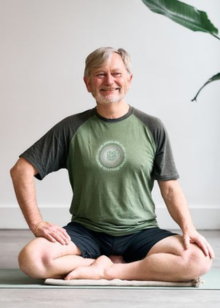After creating the “Inspiring Embodiment and Empowerment” Series for the Yogamatters Community, Stacie CC Graham and Jonelle Lewis have reignited their partnership to bring us this 4-part blog series of Black British women that inspire through their action and service. Over the next 4 weeks Jonelle and Stacie will introduce us to the history and work of an extraordinary Black British woman, and connect it to our understanding of yoga. Each week will also include a recorded guided practice, that connects with the week’s theme and Yogic Principle, and a Spotify playlist that will help you feel inspired and empowered by these stories and practices.
We can use our practice of Mati (???) to support and give us the foundation for meaningful action in the face of oppression.
Mati (???): think and reflect to understand, acquiring knowledge & understanding; reconcile conflicting ideas.
 Claudia Jones was one of the most influential Black woman thinkers and leaders of her time and is one of our Black history month inspirations. Claudia and her use of Mati (???) put her on the frontline of the Black liberation movements in the UK & US. Claudia contributed extensively to feminism and was a pioneer in intersectional feminist thought. Her best-known piece, “An End to the Neglect of the Problems of the Negro Woman!”, shows the inextricable link between her race and gender. She is also one of the founders of the world-renowned Notting Hill Carnival. She used her understanding of political theory, art, and culture to build bridges in the fight for racial equity.
Claudia Jones was one of the most influential Black woman thinkers and leaders of her time and is one of our Black history month inspirations. Claudia and her use of Mati (???) put her on the frontline of the Black liberation movements in the UK & US. Claudia contributed extensively to feminism and was a pioneer in intersectional feminist thought. Her best-known piece, “An End to the Neglect of the Problems of the Negro Woman!”, shows the inextricable link between her race and gender. She is also one of the founders of the world-renowned Notting Hill Carnival. She used her understanding of political theory, art, and culture to build bridges in the fight for racial equity.
Born as Claudia Vera Cumberbatch on 21 February 1915 in Belmont, Port of Spain, Trinidad, she migrated to Harlem in the US with her parents in 1924. Early life in America was extremely difficult for the family. Her mother died five years after the family arrived in America. It forced Claudia to temporarily drop out of school and take up factory work in order to help supplement her family’s income. Due to the poor living conditions she had, she contracted tuberculosis in 1932 which caused permanent damage to her lungs and would affect her throughout her adult life. Even though Claudia was highly intelligent and did well in school she was forced to take a job in laundry after graduation. This did not stop her creative pursuits; she wrote a regular column and was a part of the drama group of The National Urban League.
Claudia was inspired to political action by the case of the Scottsboro Boys in 1931. The Scottsboro Boys were nine Black teenagers who were falsely accused by two white women of rape during a train journey between Chattanooga and Memphis, Tennessee. Claudia’s determination to support the case of these teenagers brought her into contact with the Youth Communist League USA, the youth wing of the Communist Party USA (CPUSA). She became a member in 1936. She remained heavily involved in CPUSA for almost two decades, as an organiser, leader, editor, theoretician, and journalist. She adopted the surname “Jones” as a protective measure against McCarthyism and its persecution of communism and its supporters. After World War II, she was elected to the National Committee of CPUSA in 1948 and, shortly afterwards, became the Secretary of the Women’s Commission in the party.
Claudia was being watched by the FBI due to her involvement with CPUSA and was arrested and imprisoned on Ellis Island in 1948. She was found guilty of violation of the McCarran Act, as she was a non-US citizen (“alien”) who had joined the CPUSA. While in prison she had her first heart attack in 1951 at the age of 36. She was later convicted in the Smith Act trials for her “un-American activities” and was deported to the UK on 7 December 1955 after being refused entry to Trinidad & Tobago.
Upon arrival in Britain, Jones was disappointed by the racist hostility shown towards her as a Black woman in British communist circles. She was also horrified by the “No Irish, No Blacks/Coloureds, No dogs” policy that many landlords, shop-owners, and even government institutions adopted in pre-civil rights Britain. The arrival of Caribbean people of the Windrush Generation also saw the rise of the White Defence League, which was a white nationalist and neo-Nazi movement seeking to “Keep Britain White” by any means necessary.
Claudia Jones campaigned for equal access to basic services, such as housing and education, openly denounced the racism exercised in the employment market, and lobbied against Britain’s racist Immigration Act of 1876. Her influence was pivotal to ensuring the progress of the British Civil Rights movement in the 1950s and 60s.
In 1958 in Brixton she set up The West Indian Gazette, an anti-imperialist and anti-racist publication, to provide Caribbean people within Britain with the voice they needed to seek their liberation. Increased consciousness within the British African-Caribbean community is credited to Claudia Jones and her monthly West Indian Gazette.

In August of 1958 racial tensions reached a boiling point resulting in days of protest and unrest between racist whites and the Black community in Notting Hill. Black British community leaders turned to Jones for help and guidance during this period of heightened public, racially-driven animosity towards Black people in the UK. Her idea for a carnival for the West Indian community, which would serve as an empowering and cathartic solution was born, and this developed into what we now recognise as Notting Hill Carnival. These celebrations were broadcast on the BBC in January 1959. The slogan of this predecessor to Notting Hill was “A people’s art is the genesis of their freedom.”
Suffering from ailing health due to her childhood bout with tuberculosis, Claudia Jones sadly passed away due to a severe heart attack on 24 December 1964 in England, and was found at her flat on Christmas Day. Her death sent shockwaves throughout the Black community, both in Britain and internationally.
Claudia Jones’ legacy is a testament to how influential she was as a Black feminist, political theoretician, writer, creative, and leader. Throughout her life she embodied the philosophy of Mati (???) to raise consciousness and be a change agent wherever she was in the world.
To practice yoga on and off the mat we need Mati (???) to be able to think and reflect so our actions create inclusion and equity. When our actions are rooted in Mati (???) – as opposed to being performative – we are able to empower and uplift marginalised/minoritised people. We honour Claudia Jones for leading her life in a way that demonstrates this.
Try this week’s guided practice:
Listen to this week’s Spotify playlist:
You can listen to this week’s Spotify playlist for inspiration and empowerment here.














